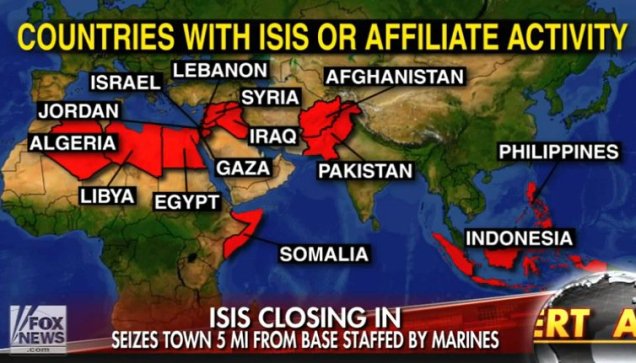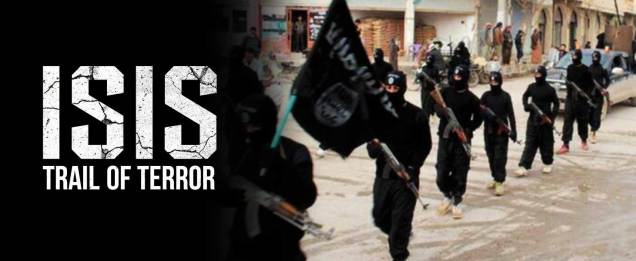
The successive brutal massacres by ISIS (Islamic State in Iraq and al-Sham) represented a “rule of terror”, varying from beheadings, slaughtering, and abduction, to systematic killings, driven by their declared goal to establish their version of the Islamic Caliphate. ISIS’s goal is to control all Muslim states, as well as extending to all non-Muslim ones, which it aims to reach through applying terrorist, inhumane methods. This leaves no doubt that ISIS’s existence and acts are real threats to the international peace and security. This blog post analyzes whether members of ISIS can be prosecuted before the International Criminal Court (ICC).
Generally, terrorism is interpreted within the context of violence with the intention to “create a climate of fear” in order to achieve political goals. Failure to tackle terrorism in domestic legislation efficiently and comprehensively may indicate a general inability or a political unwillingness on the part of the concerned state. This raises the debate of the complementarity role of the ICC. The controversies between the pros and cons of adding the crime of terrorism in the Rome Statute are based on the lack of a comprehensive definition of terrorism. Unlike other international crimes, which fall under customary international law, there is no consensus between jurists on a definition of terrorism, based on the risk of over or under inclusiveness or over exclusiveness.
Although the lack of a comprehensive definition hinders adding terrorism as a distinct crime under the ICC’s jurisdiction, some terrorist attacks may be characterized as either crimes against humanity or war crimes. However, although two examples of war crimes (namely ‘taking hostages’ and ‘systematic attack against civilians’) match terrorist attacks, war crimes require the existence of an armed conflict -whether of an international or non-intentional character- which excludes terrorist attacks that occur outside the context of armed conflicts.
On the other hand, the absence of wartime conditionality in crimes against humanity makes it possible to encompass terrorism, if it is committed in a wide-spread systematic way. Although Art (7) of the Rome Statute includes crimes against humanity committed by non-state actors such as terrorist militias, it excludes some terrorist attacks which do not fall under the criteria of Art (7), for example burning alive the Jordanian fighter pilot Maaz al-Kassasbeh which lacks the civil status conditionality of the victims according to Art (7) of the Rome Statute. These types of acts still aim at terrifying a population or coercing a government in conformity with the criteria set by The International Convention for the Suppression of Terrorist Bombings, adopted by the GA. Res. 52/164.
The crimes committed by ISIS are “tailor-made for ICC intervention”. According to the Pre-Trial chamber of the ICC, the criteria for investigating crimes against humanity are: – there must be a systematic attack against civilians, and the perpetrator must have “the capability to perform acts which infringe on basic human values”, hierarchy, the control of territory, and financial support.
Basing on the previous point, the number of atrocities committed by ISIS between 2013 and 2015 and its systematic tactics, including the brutal and systematic killings and abductions of members of religious and ethnic minorities such as Yazidis in a number of different states including Libya, Iraq, and Syria, destruction of archaeological sites, the beheading of soldiers and journalists in Syria and Iraq as well as civilians in Libya shows that it meets the requirements set by the ICC for categorizing actions as a ‘crimes against humanity.’ In addition, the geographical distribution of the territory it controls in Syria, Iraq and Libya shows the depth and extent of massive influence of the group.

Another limited possibility could be ISIS’s prosecution under the crime of aggression, which requires the aggressor to be a state. Although there is a debate about whether ISIS fulfills the requirements of being a state under The Montevideo Convention on the Rights and Duties of States in 1933, there is an incident by the SC Res 405 in 1977 when it considered non state actors as aggressors in case of mercenaries in the People’s Republic of Benin. However, the ICC Statute provision concerning the crime of aggression will only come into effect starting 2017.
On the other hand, although the crimes committed by ISIS qualify as the subject matter of jurisdiction of the ICC under crimes against humanity, the ICC cannot -in principle- start an investigation into these atrocities because neither Iraq, Libya nor Syria have ratified the Rome Statue. This lack of ratification hinders the investigation process of ISIS. It is important to note that the Nigerian ratification enabled the ICC to pursue an investigation concerning the terrorist group Boko Haram and its attacks.
However, there are still two options for the ICC to prosecute ISIS which are; first the public prosecutor’s authority to start an investigation on the situation under article (15). However, this is still limited to the territorial and personal basis of jurisdiction of the court. In this case, considering that the territorial aspect is not available (because the states where the crimes are being committed did not ratify the ICC), there are many members of ISIS (about 3000) that hold citizenship of a European state which ratified the Rome Statute thus triggering the jurisdiction of the court. Although the most important are the leaders of the group rather than the minor members and that such investigation is not sufficient to deter the group, but at least this will weaken its forces and take a step toward combating the group internationally.
The second alternative is referral from the United Nations Security Council, which affirmed in its previous resolutions 1368 (2001), 1373 (2001), and 1566 (2004) that terrorism is considered a threat to international peace and security and recently Res 2170 (2014)which strongly condemned the acts of ISIS.The feasibility of this alternative depends on the political interests of the five permanent members of the Security Council and their political cost-benefit calculations which allowed a referral of the case in Libya in 2011 under SC Res 1970 and hindered a counterpart resolution on Syria despite the similar brutal circumstances. Such a referral would potentially cover all crimes committed within Syria in the context of the civil war in which ISIS is currently engaged.

To sum up, the broad variety of acts which could be labeled as terrorist acts still impede the drafting of a comprehensive definition of terrorism. As a result it cannot be included as one of the international crimes in the Rome Statute. However, the necessity for finding common characteristics between some terrorist attacks, crimes against humanity, and war crimes provides an opportunity for including the terrorist attacks. A case in point is the ISIS terrorist attacks in Iraq, Syria, and Libya which meet the requirements of ‘crimes against humanity’ according to the Rome Statute. Therefore, the two viable options for ICC’s prosecution of ISIS which are a referral from the UN Security Council or the public prosecutor’s starting of an investigation of the crimes committed by ISIS’s perpetrators who hold a citizenship of a state which has ratified the ICC’s Rome Statute.
I really enjoyed reading your blog, Sarah. It is very well-written and concise. My hats off to you!
In discussing the content of the post, your arguments of whether the ICC has jurisdiction to try ISIS in a tribunal are extremely valid. Under Article 12 of the Rome Statute, regarding jurisdiction, the only situations where the Court may exercise jurisdiction is if (1) the State is Party to the Rome Statute, (2) the crime was committed on the territory of a State Party to the Rome Statute, or (3) the person committing the crime is a national of a State Party to the Rome Statute. The exceptions to this, which you so beautifully stated, is if the state in question has accepted the jurisdiction of the Court, if the Security Council refers the case to the Court, or if the Prosecutor decides to investigate the case himself. You mentioned that none of these conditions apply in the case of the ISIS attacks considering that Iraq, Syria, and Libya are not State Parties to the Rome Statute.
However, it must be noted that Syria is a signatory (not a ratifier) to the Rome Statute and under Article 18 of the Vienna Conventions on the Law of Treaties (VCLT), Syria is obliged to adhere to the general principles of the Rome Statute by virtue of being a signatory. This could potentially allow the Court to have some sort of jurisdiction over the crimes being committed; however, there needs to be extensive research done to grant this jurisdiction in order to prove that ISIS could be held accountable on the grounds that the attacks have occurred on the territory of a signatory. This may be a farfetched idea, but I believe it’s worth looking into.
Moving on to the discussion regarding terrorism, I wanted to draw your attention to the politicization of the discourse of international law regarding this issue. It seems to me that being able to formulate definitions for concepts such as war crimes, crimes against humanity, crimes of aggression, and genocide and being able to apply them accordingly should make the formulation of a definition of terrorism much simpler than the international community makes it seem. Ruling out the four definitions enshrined in the Rome Statute, it seems that the definition of terrorism should be relatively explanatory. The issue with the definition of terrorism is not that it is difficult to identify what a terrorist act entails (bearing in mind it took about 5 pages to define war crimes), it is that there is no universally agreed upon definition, which brings me to my argument of politicization.
It is not in the best interest of those who have had terrorist crimes committed against them to have an elaborate definition of terrorism that is universally recognized. The ambiguity in the term terrorism allows for states wishing to prosecute other states for terrorist acts (whether they are committed by the state itself or by a non-state actor) allows them to stretch the limits of international law under the banner of self-defense, which is in fact a reprisal in many cases. It also allows for an elongated period of being able to use self-defense, much like the actions the US took against Iraq and Afghanistan post-9/11. Furthermore, it stretches the limits of necessity and proportionality whereby states may argue that their acts are proportional (which they may very well not be) due to the threat of future attacks and because terrorist attacks have a large scale. By creating a definition of terrorism, the international community will effectively be limiting the ability for states to classify an act as terroristic if it does not fall under this universal definition. Also, when the term terrorism is defined, doctrines will emerge to allow for further limitations on the acceptable acts of self-defense or retaliation. This is why I believe that it is purposeful to maintain the ambiguity of the term terrorism by states who have a stake in maintaining its ambiguity.
If the term terrorism is defined and incorporated in the Rome Statute, this would allow for several individuals to be prosecuted in the ICC, which is beneficial for the international community, but not the state in question if the individual is a prominent figure in the state. In any event, it would still be difficult to prosecute ISIS for any of the mentioned crimes, including terrorism, because of the factors you mentioned. The chances of the Security Council referring ISIS to the Court are slim because of the political interests of the P5 within the Council as well as the block between Russia and the US. Ideally, the Prosecutor should take it upon himself to investigate the matter on his own, but this requires a great deal of research and will also be faced with great opposition from certain parties with vested interests in the turmoil happening in the region.
These are my thoughts on what you wrote, please feel free to refute them! All in all, a very enjoyable read and a wonderful job, Sarah!
LikeLiked by 1 person
Thank you for your beneficial comment Omneya. Concerning the signatory status it is not sufficient to trigger the prosecutions under the jurisdiction of the court , although states should adhere to the purpose and object of the statute based on Vienna convention on the law of treaties. This explains why there are many states refrain from ratifying and confine their participation on signing the treaty.
I agree with you concerning the issue of the problem of the definition of terrorism which not only allow manipulation of its use in international relations, but also violates the principle of legality which requires a clear definition for the crimes before prosecuting who has committed it.
I also agree that the viability of the option of the referral of the SC is not so high, however it still possible because the interests and cost and benefit calculations change over time and till then I believe that the options that I introduced in the post include challenges, but still not impossible.
Thanks
LikeLiked by 1 person
A year and seven months after the publication of this article, it has been reported by Reuters that two mass graves of at least 18 members of Iraq’s Yazidi minority, thousands of whom have been killed and kidnapped by Islamic State, have been discovered as security forces fight to dislodge the militants from Mosul.
Geopolitical concerns impede effective and timely prosecution of human rights violations and international crimes. The hands of the International Criminal Court (ICC) appear to be tied and a double Security Council Veto by the permanent members, Russia and China, blocked a resolution to refer the situation to the Court. Despite the draft of a Statute as early as 2013, the call for the establishment of a hybrid tribunal by the UN Commission of Inquiry and academic support for this approach as the next best alternative, no tangible mechanism has resulted thus far.
Perpetrators of the international crime of genocide have not been charged & punished pursuant to Arts. VI & IV of the Genocide Convention of 1948 and remain unencumbered to continuously commit genocide or any of the other acts enumerated in article III of the said Convention. Even as late as June 2016, an U.N.-appointed commission of independent war crimes investigators said that Islamic State was committing genocide against the Yazidis.
What other recourse is there for affected populations of atrocity crimes that have been unequivocally accepted by the international community as international crimes? UNSC Resolution 2249/2015 had already determined that ISIS constitutes “a global and unprecedented threat to international peace and security.”
Even an “internal armed conflict” would still constitute a “threat to the peace” according to the settled practice of the Security Council and the common understanding of the United Nations membership in general. Indeed, the practice of the Security Council is rich with cases of civil war or internal strife which it classified as a “threat to the peace” and dealt with under Chapter VII, with the encouragement or even at the behest of the General Assembly, such as the Congo crisis at the beginning of the 1960s and, more recently, Liberia and Somalia. It can thus be said that there is a common understanding, manifested by the “subsequent practice” of the membership of the United Nations at large, that the “threat to the peace” of Article 39 may include, as one of its species, internal armed conflicts or even international conflicts involving non-state actors etc.
Obviously, paragraph 1 of the resolution, the Council similarly “regards all such acts of [ISIS] terrorism as a threat to peace and security,” which again implicitly invokes Article 39. As the ICJ’s Namibia Advisory Opinion makes clear, the lack of reference to Chapter VII in a resolution does not mean that it is not to be regarded as binding nor does it mean that the resolution does not have operative legal effect. However, for the resolution to have those effects the Council must actually decide to do something or to authorize something.
The resolution calls on states to take all necessary measures in compliance with international human rights law as well as international humanitarian law (and refugee law).
Case Scenario – IRAQ
Iraq is not a Party to the International Criminal Court/Rome Statute and thus far has not chosen to refer the current conflict to the ad hoc jurisdiction of the Court pursuant to Article 12 of its Statute.
The Government of Iraq has requested the United Nations Security Council assist with ensuring accountability, but this does not relieve Iraq from its own obligations to ensure accountability through its domestic jurisdiction. On 6 May 2016, H.E. Mr Mohamed Ali Al Hakim, Permanent Representative of Iraq to the United Nations called upon the UN Security Council to “…set up a specific international legal mechanism for investigating and bringing to justice the criminals of ISIL.” : UN Security Council, 7689th Meeting, (6 May 2016), UN Doc S/PV.7689, 5.
With the traffic of withdrawal states from the ICC itself, thus, the resounding echoes for the establishment of an UN-sanctioned International Tribunal which has been repeatedly approved and endorsed by the “representative” organ of the United Nations, the General Assembly : this body not only participated in its setting up, by electing the Judges and approving the budget, but also expressed its satisfaction with, and encouragement of the activities of the International Tribunal in various resolutions, [(see G.A. Res. 48/88 (20 December 1993) and G.A. Res. 48/143 (20 December 1993), G.A. Res. 49/10 (8 November 1994) and G.A. Res. 49/205 (23 December 1994)], according to the rule of law, it must be established in accordance with the proper international standards; it must provide all the guarantees of fairness, justice and even-handedness, in full conformity with internationally recognized human rights instruments.
http://www.reuters.com/article/us-mideast-crisis-iraq-graves-idUSKBN13M075
http://www.huffingtonpost.com/entry/thousands-of-yazidis-missing-captive-amid-ongoing-genocideun_us_57a1e339e4b0693164c34759
http://www.ohchr.org/en/NewsEvents/Pages/DisplayNews.aspx?NewsID=20113&LangID=E
https://news.vice.com/article/isis-is-still-holding-nearly-2000-yazidi-women-as-slaves
https://www.theguardian.com/world/2016/nov/16/russia-withdraws-signature-from-international-criminal-court-statute
LikeLike